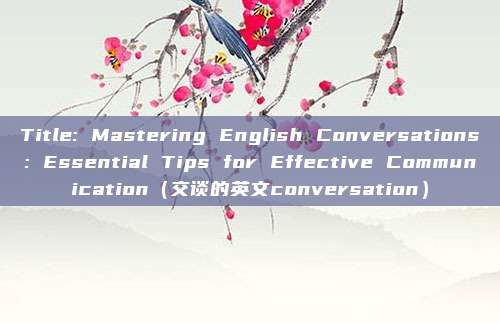Title: Mastering English Conversations: Essential Tips for Effective Communication(交谈的英文conversation)
温馨提示:这篇文章已超过211天没有更新,请注意相关的内容是否还可用!
Introduction:
In our increasingly globalized world, the ability to communicate effectively in English has become more crucial than ever. Whether you're traveling, working in an international environment, or simply connecting with people from different cultures, mastering English conversations is key. This article delves into essential tips and strategies to enhance your English conversation skills, with practical advice and engaging dialogue examples.
Paragraph 1: The Basics of English Conversations
The foundation of any successful English conversation lies in basic grammar and vocabulary. Start by ensuring you have a strong grasp of the language's structure. According to a report by the British Council, over 2 billion people worldwide are learning English, making it essential to have a solid foundation.

"Hello, how are you today?" is a common opening line in English conversations. It's important to be polite and friendly from the start. Here's an example of a typical dialogue:
You: "Hello, how are you today?"
Friend: "I'm doing well, thanks. And you?"
You: "I'm good, thanks for asking."
Remember to use the present continuous tense to describe ongoing actions, as in "I'm doing well" or "I'm good."
Paragraph 2: Active Listening and Engagement
A crucial aspect of effective communication is active listening. This means not just hearing the words, but understanding the context and responding appropriately. The key to active listening is to show interest and engage with the speaker.
For instance, if your friend mentions they're going on vacation, you can respond with, "That sounds amazing! Where are you going?" This demonstrates that you're not only listening but also interested in the conversation.
Paragraph 3: Common Phrases and Expressions
Knowing common phrases and expressions can greatly enhance your English conversation skills. Here are a few useful ones:
- "Can you repeat that?" – Use this when you didn't catch what the speaker said.
- "I'm sorry, I don't understand." – Politely express that you need clarification.
- "That's interesting." – Show that you're engaged and interested in the conversation.
For example, if someone says, "I just started a new job," you could respond with, "That's interesting. What do you do?"
Paragraph 4: Non-Verbal Communication
Non-verbal communication, such as body language and facial expressions, plays a significant role in English conversations. Maintaining eye contact, smiling, and nodding can help convey your interest and understanding.
For instance, when someone tells a joke, a slight smile and a nod can indicate that you're enjoying the conversation.
Paragraph 5: Practice and Patience
Improving your English conversation skills takes practice and patience. Engage in conversations with native speakers whenever possible, and don't be afraid to make mistakes. Remember, everyone was once a beginner.
According to a study by the University of Cambridge, speaking with native speakers and immersing yourself in the language can significantly improve your proficiency.
Conclusion:
Mastering English conversations is a valuable skill that can enhance your personal and professional life. By focusing on the basics, active listening, using common phrases, understanding non-verbal communication, and practicing regularly, you'll be well on your way to becoming a confident and effective communicator. Remember, success in English conversations is not just about the words you say, but also about how you say them and how you engage with others.
网站文章、图片来源于网络,以不营利的目的分享经验知识,版权归原作者所有。如有侵权请联系删除!





还没有评论,来说两句吧...